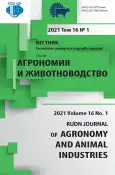Effect of growth stimulants on yield and quality of grain corn grown in Piedmont subprovince of Dagestan
- Authors: Khashdahilova S.M.1, Musaev M.R.1, Khalilov M.B.1, Magomedova A.A.1
-
Affiliations:
- Dagestan State Agrarian University
- Issue: Vol 16, No 1 (2021)
- Pages: 54-65
- Section: Crop production
- URL: https://journal-vniispk.ru/2312-797X/article/view/315464
- DOI: https://doi.org/10.22363/2312-797X-2021-16-1-54-65
- ID: 315464
Cite item
Full Text
Abstract
Field experiments were carried out on chestnut soils of Piedmont Dagestan in 2018-2020. Hybrids of grain corn treated with different growth stimulants were the object of еру research. The experiments showed that the harvesting ripeness of hybrids ROSS 299 MV and Mashuk 355 MV occurred 2...5 days earlier after treatment with growth stimulants compared to the control. The growth stimulants used in the experiment did not have a significant effect on seed germination rate. Among the studied hybrids, the highest seed germination were observed in Mashuk 355 MV hybrid. The highest values of leaf area and net productivity of crops were in hybrid Mashuk 355 MB. Plants treated with growth regulators had higher leaf surface by 4.4% and 5.5%; 6.0 % and 8.4%, respectively. Approximately the same dynamics was recorded for photosynthesis net productivity and accumulation of dry matter. Mashuk 355 MV hybrid showed the best yield, which was 30.5; 31.5 and 32.5% higher respectively, compared to the standard. Productivity of corn hybrids treated with growth regulators increased significantly. The highest data were observed on plants treated with Megamiks N10 growth regulator, which were higher than the control data by 30.0 and 32.5%, respectively. Aminokat 30% growth regulator increased corn productivity by 23.7 and 24.7%, respectively. Sufficiently high indicators of yield structure were 10 recorded in Mashuk 355 MV hybrid in the variant with the Megamiks N10 growth stimulator.
About the authors
Shumaysat Murtazalievna Khashdahilova
Dagestan State Agrarian University
Author for correspondence.
Email: shumakaktus@mail.ru
PhD student, Department of Land Management and Cadastres
180, M. Gadzhieva st., Makhachkala, 367032, Russian FederationMagomed Rasulovich Musaev
Dagestan State Agrarian University
Email: musaev5858@mail.ru
Doctor of Biological Sciences, Professor, Head of the Department of Land Management and Cadastres
180, M. Gadzhieva st., Makhachkala, 367032, Russian FederationMagomednur Burganudinovich Khalilov
Dagestan State Agrarian University
Email: khalilov625@mail.ru
Doctor of Agricultural Sciences, Professor, Department of Technical Systems and Digital Services
180, M. Gadzhieva st., Makhachkala, 367032, Russian FederationAminat Akhmedovna Magomedova
Dagestan State Agrarian University
Email: daggau_aminat@mail.ru
Candidate of Agricultural Sciences, Associate Professor, Department of Land Management and Cadastres
180, M. Gadzhieva st., Makhachkala, 367032, Russian FederationReferences
- Bukhov NG, Samson G, Carpentier R. Nonphotosynmetic Reduction of the Intersystem Electron Transport Chain of Chlorophlasts Following Heart stress. Steady-State Rate. Photochemistry and Photobiology. 2000; 72(3):351—357. doi: 10.1562/0031-8655(2000)0720351NROTIE2.0.CO2
- Dammer KH. Technologie der Prazions landwirtschaft. Jahresbericht ATB 2006. Potsdam-Bornim; 2007. p.16—17.
- Fuentes JL. El suelo y los fertilizantes. Barcelona: Mundi Prensa; 1994. p. 55—71.
- Harbur MM, Cruse RM. Higher population and twin row configuration does not benefit strip intercropped corn. Journal of the Iowa Academy of Science. 2000; 107(1):3—9.
- Montesinos E, Bonaterra А, Badosa Е, Frances J, Alemany J, Moragrega С. Plant-microbe interactions and the new biotechnological methods of plant disease control. International Microbiology. 2002; 5(4):169—175. doi: 10.1007/s10123-002-0085-9
- Adaev NL, Khamzatova MH, Amaeva AG, Muuev AA, Adaev AN. Intensification of the corn fertilizer system in the conditions of irrigation in the Chechen Republic. Kukuruza i sorgo. 2019; (2):14—21. doi: 10.25715/KS.2019.2.31829 (In Russ).
- Bagrintseva VN. Hybrids of corn for the southern Russia. Kukuruza i sorgo. 2014; (1):9—11. (In Russ).
- Bagrintseva VN. Corn yield depending on growing conditions. Forage production. 2014; (11):22—26. (In Russ).
- Bagrintseva VN, Shmalko IA, Kuznetsova SV, Ivashenenko IN, Guba E.I. Influence of agrotechnical methods on yields of maize Mashuk 355 MB. Scientific life. 2017; (11):57—65. (In Russ).
- Bagrintseva VN, Shmalko IA, Kuznetsova SV, Ivashenenko IN, Guba EI. Elements of technology for the cultivation of early maturing and mid-early corn hybrids in the Stavropol Territory. Novosti nauki v APK. 2018; (1):9—13. (In Russ). doi: 10.25930/2218-855x-2018-1-10-1219
- Klyushin PV, Musaev MR, Khashdakhilova SM. Increasing the productivity of corn for grain in the Piedmont sub-province of the Republic of Dagestan against the background of treatment with growth regulators. Integral International journal of applied sciences and technology. 2020; (2-2):74—78. (In Russ). doi: 10.24411/2658-3569-2020-10074
- Magomedova ZN, Musaev MR. Improvement of the technology of cultivation of hybrids of corn for grain in the Tersko-Sulak sub-province of the Republic of Dagestan. Development problems of regional agroindustrial complex. 2020; (4):113—116. (In Russ). doi: 10.15217/issn2079-0996.2020.3.113
- Musaev MR, Kuramagomedov AU, Musaeva ZM, Khashdahilova SM. The influence of growth regulators on the productivity of corn for grain in the Piedmont subprovince of the Republic of Dagestan. Dagestan GAU Proceedings. 2020; (1):90—93. (In Russ).
- Savinova SV, Musaev MR, Musaeva ZM, Magomedova ZN. Development of an environmentally friendly technology for cultivating corn hybrids for grain under irrigated conditions in Dagestan. Integral International journal of applied sciences and technology. 2020; (2-2):147—152. (In Russ). doi: 10.24411/26583569-2020-10071
- Gasanov GN, Gasanbekov GR, Abdurakhmanov YZ, Shakhbazov GN. Tekhnologicheskii proekt vozdelyvaniya kukuruzy [Maize cultivation technology project]. Makhachkala; 1989. (In Russ).
- Gasanov GN. Osnovy sistem zemledeliya Zapadnogo Prikaspiya [Fundamentals of farming systems in the Western Caspian region]. Makhachkala; 2008. (In Russ).
- Gimbatov AS. Resursosberegayushchaya tekhnologiya vozdelyvaniya kukuruzy [Resource-saving corn cultivation technology]. Makhachkala, 2002.40 p. (In Russ).
- Dospekhov BA. Metodika polevogo opyta [Field experiment technique]. Moscow: Kolos publ.; 1985. (In Russ).
Supplementary files










